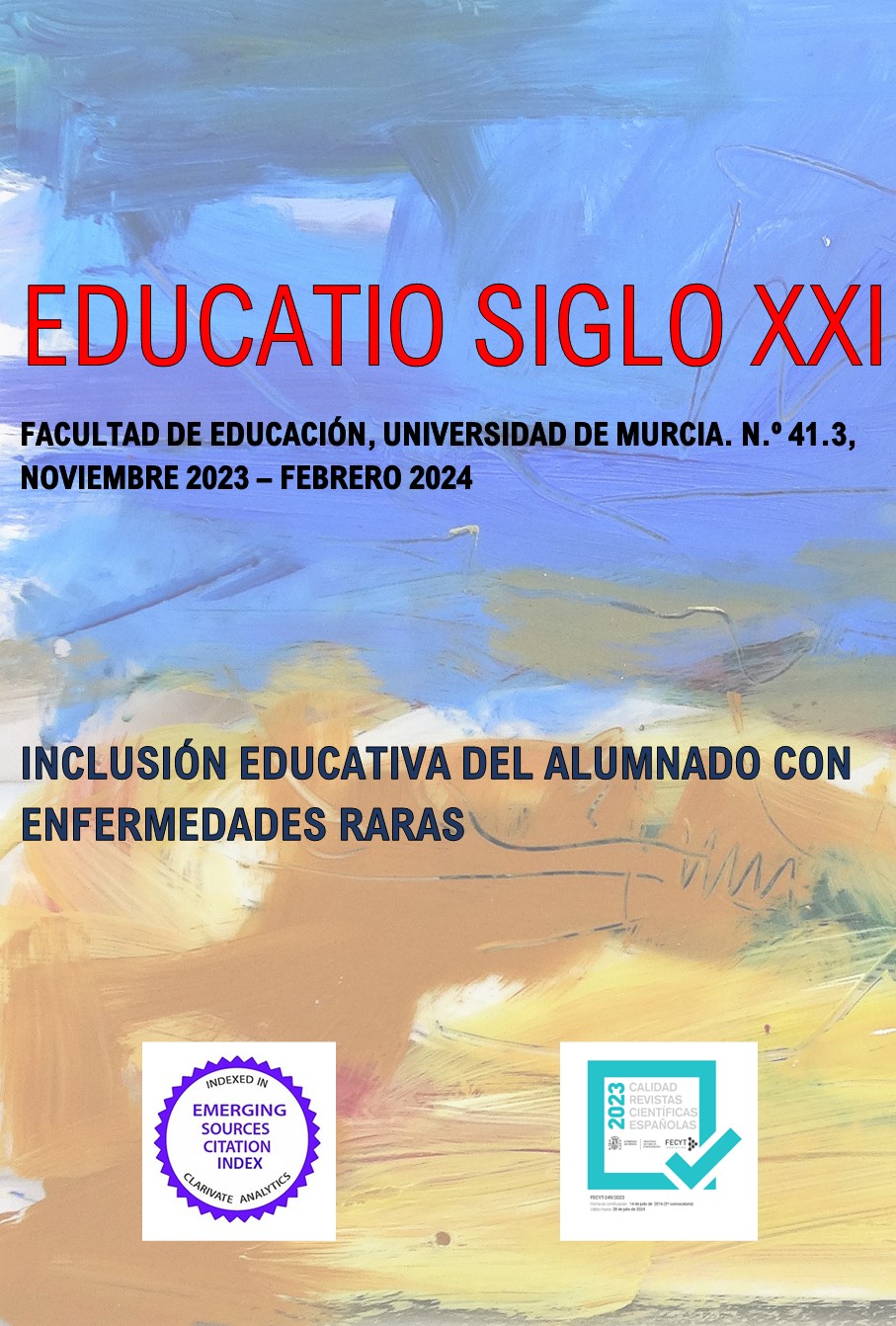Developing inclusive processes as a response to the socio-educational needs of students with rare diseases
Abstract
This article presents the results related to the educational processes that favor the inclusion of students with Rare Diseases. For this purpose, we analyze the teaching planning, the methodological variety, the type of grouping, the organization of spaces and times, the support, the evaluation, the school transitions and the coordination. The methodology used was qualitative through interviews with families, educational professionals and students with Rare Diseases. The results show the need to incorporate inclusive practices and processes that promote the presence, participation and achievement of all students without exclusions. In the good inclusive practices analyzed, the inclusion of students in the regular classroom also requires a global restructuring of the school to respond from the unit (as a whole) to the diversity of needs. In general, participatory, active and flexible methodologies, heterogeneous groups and cooperative groupings are used and combined at both the curricular and organizational levels. The organization of spaces and times is fundamental, trying to adapt them to comply with the rights so that they are physically and socially accessible to all students. Likewise, school transitions are planned in order to take care and guarantee that the new changes do not represent additional barriers and obstacles for students with RERD. In short, it is essential to plan and design processes that guarantee the inclusion of all students and respond to different needs.
Downloads
-
Abstract582
-
PDF (Español (España))371
References
Arnaiz, P., De Haro, R., & Azorín, C. (2018). Redes de apoyo y colaboración para la mejora de la educación inclusiva. Profesorado, Revista de Currículum y Formación del Profesorado, 22(2), 29-49.
Bernal, R., & Rodríguez, X. (2021). Políticas educativas inclusivas para el aprendizaje y la participación de los estudiantes. Revista Metropolitana de Ciencias Aplicadas, 4(2), 252-259.
Booth, T. (2000). Progreso en la educación inclusiva. Estudio Temático para la evaluación de educación para todos. UNESCO.
Booth, T., & Ainscow, M (2004). Índice de Inclusión: desarrollando el aprendizaje y la participación en las escuelas. UNESCO. Revista Electrónica Iberoamericana sobre Calidad, Eficacia y Cambio en Educación, 4(3), 1-15.
Casanova, M.A. (2018). Educación inclusiva: ¿Por qué y para qué? Revista Portuguesa y Educaçao, 31, 42-54.
Castro, A., & García-Ruiz, R. (2013). La escolarización con enfermedades raras. Visión de las familias y del profesorado. REICE. Revista Iberoamericana sobre Calidad, Eficacia y Cambio en Educación, 12(1), 119-135.
Echeíta, G., & Duk, C. (2008). Inclusión educativa. Revista Iberoamericana sobre Calidad, Eficacia y Cambio en Educación, 6 (2), 1-8.
Monge, C., Domingo, J. & Torrego, J. (2018). Cultura de colaboración en un centro educativo: aportaciones desde el asesoramiento. Educatio Silgo XXI, 36(2), 277-302.
Posada, M., Martín-Arribas, C., Ramírez, A., Villaverde, A., & Abaitua, I. (2008). Enfermedades raras: Concepto, epidemiología y situación actual en España. Anales del sistema sanitario de Navarra, 31(2), 9-20
Sandoval, M., Simón, C., & Echeíta, G. (2012). Análisis y valoración crítica de las funciones del profesorado de apoyo desde la educación inclusiva. Revista de Educación, número extraordinario, 117-137.
Santamaria, A., & Federación Española de Enfermedades Raras (2022). Educar en Red. Recursos para la Inclusión. Ministerio de Derechos Sociales y Agenda 2030.
Sapon-Shevin, M. (2013). La inclusión real: Una perspectiva de justicia social. Revista de Investigación en Educación, 11(3), 71-85.
Sierra, S., Fiuza, M., & Parrilla, Á. (2019). Investigación participativa con jóvenes con discapacidad visual: Cuando los relatos de exclusión e inclusión salen a la calle. Revista Internacional de Educación para la Justicia Social (RIEJS), 8(2), 49-64.
UNESCO, 2015. Guidelines for Inclusion: Ensuring Access to Education for all. UNESCO.
Verger, S., Roselló, R., Rosa, M., & De la Iglesia Mayol, B. (2016). Educación Física y atención al alumnado con enfermedad crónica en la escuela. Revista de psicología del deporte, 25(1), 0195-200.
Copyright (c) 2023 Servicio de Publicaciones de la Universidad de Murcia

This work is licensed under a Creative Commons Attribution-NonCommercial-NoDerivatives 4.0 International License.
Original work publishes in this journal is subject to the following terms:
1. Murcia University Press (the publishing house) holds the copyright of the publishes work, and favours and allows their reutilization under the use license stated in point 2.
© Servicio de Publicaciones, Universidad de Murcia, 2015
2. Work is published in the electronic edition under a license (Creative Commons Reconocimiento-NoComercial-SinObraDerivada 4.0 España (legal text). They can be copied, used, disseminated, transmitted and publicly presented, as long as: i) authorship and original publication source is acknowledged (journal, publishing house and URL of the work); ii) are not used for commercial purposes; iii) the existence and specifications of this use license is stated.
3. Conditions for self-archive. Authors are allowed and encouraged to disseminate electronically the pre-pint (before review) and/or post-print (accepted for publication) versions of their work before their publication since that favours earlier circulation and dissemination resulting in an increased chance for the authors to be cited and for the work to reach a bigger share of the academic community. Colour: RoMEO: green.







